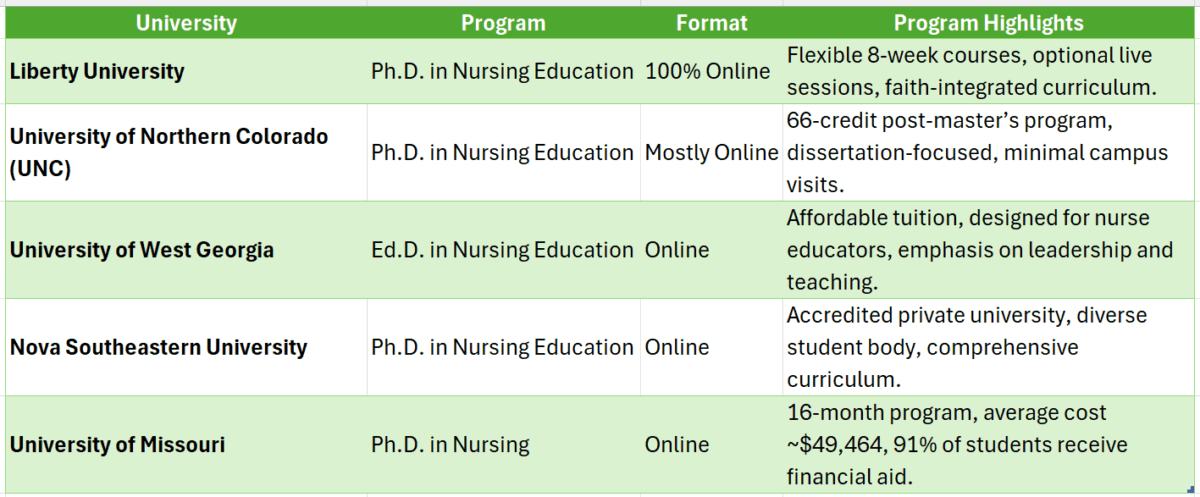
When considering a doctorate in nursing education online programs, choosing the right online program is crucial. These programs not only enhance your skills but also open doors to advanced career opportunities. With the flexibility of online learning, you can balance your studies with work and personal commitments, making it an appealing option for many aspiring educators.
Key Features to Look For
- Accreditation: Ensure the program is accredited to guarantee quality education.
- Curriculum: Look for a curriculum that covers essential topics like teaching strategies and nursing theory.
- Support Services: Check if the program offers academic advising and career services to help you succeed.
Top Online Programs
- University of Phoenix: Known for its comprehensive online doctorate in nursing education, it offers a robust curriculum and flexible scheduling.
- Walden University: This program focuses on preparing nurse educators with a strong emphasis on research and practical application.
- Capella University: Offers a unique blend of online learning and hands-on experiences, making it a favorite among students.
These doctorate in nursing education online programs are designed to equip you with the knowledge and skills needed to thrive in the field. As you explore your options, consider how each program aligns with your career goals and personal needs. Remember, investing in your education is investing in your future!
Study smarter, not harder—Enroll online today!
What to Look for in an Online Doctorate in Nursing Education Program?
Choosing the right online program for a doctorate in nursing education is crucial for your career. With so many options available, it can feel overwhelming. However, understanding what to look for can help you make the best choice for your future. Let’s dive into the key factors to consider!
Accreditation Matters
When searching for doctorate in nursing education online programs, ensure they are accredited. Accreditation guarantees that the program meets high educational standards. This is important not just for your learning experience but also for your future job prospects. Employers often prefer graduates from accredited institutions.
Faculty Expertise
Look for programs with experienced faculty. Professors who have real-world experience in nursing education can provide valuable insights. They can also guide you through your studies, making your learning experience richer and more practical. Don’t hesitate to check their qualifications!
Flexibility and Support
Online programs should offer flexibility to fit your busy life. Look for options that allow you to study at your own pace. Additionally, check if they provide support services, like academic advising or tutoring. This can make a big difference in your success as you pursue your doctorate in special education or even a doctorate in science education.
The Benefits of Pursuing a Doctorate in Nursing Education Online
Pursuing a doctorate in nursing education online programs is a significant step for those looking to advance their careers. It opens doors to leadership roles and enhances your ability to teach the next generation of nurses. But why choose an online program? Let’s explore the benefits!
Flexibility and Convenience
One of the biggest advantages of online programs is flexibility. You can study at your own pace and on your own schedule. This is especially helpful for busy professionals who may also have family commitments.
Cost-Effectiveness
Online programs often come with lower tuition fees compared to traditional on-campus options. Plus, you save on commuting and housing costs. This makes pursuing a doctorate in nursing education online programs a smart financial choice.
Access to Diverse Resources
Online education provides access to a wealth of resources. You can connect with experts in the field, access online libraries, and participate in virtual discussions. This enriches your learning experience, similar to what you would find in a doctorate in special education or doctorate in science education.
How Do Online Doctorate Programs in Nursing Education Compare to Traditional Ones?
When considering a doctorate in nursing education online programs, many wonder how they stack up against traditional on-campus options. This choice is crucial for aspiring nurse educators who want flexibility while still receiving a quality education. Let’s explore the differences and benefits of each approach.
Flexibility and Convenience
One of the biggest advantages of online programs is flexibility. Students can study at their own pace, fitting classes around their busy schedules. This is especially beneficial for working nurses who may not have the time to attend traditional classes.
Learning Environment
Online programs often provide a unique learning environment. Students can engage with peers and instructors through discussion boards and video calls, creating a sense of community. In contrast, traditional programs offer face-to-face interactions, which some may prefer for networking and support.
Cost and Accessibility
Cost can also be a factor. Online programs often have lower tuition fees and eliminate commuting costs. Plus, they can be more accessible for those living in remote areas. However, traditional programs might offer more hands-on experiences, which are essential in nursing education.
In summary, both options have their pros and cons. Whether you choose a doctorate in special education or a doctorate in science education, consider what fits your lifestyle and career goals best.
Top-Ranked Online Doctorate in Nursing Education Programs You Should Consider

Choosing the right online program for a doctorate in nursing education is crucial for aspiring educators. With the demand for skilled nursing professionals on the rise, these programs equip you with the knowledge and skills to lead in the field. Let’s explore some top-ranked options that can help you achieve your goals.
- University of Phoenix: Known for its flexible online format, this program offers a comprehensive curriculum that blends theory with practical application. Students benefit from experienced faculty and a supportive learning environment.
- Capella University: This program emphasizes leadership and innovation in nursing education. With a focus on research and evidence-based practice, graduates are well-prepared for roles in academia and healthcare organizations.
- Walden University: Walden’s online doctorate in nursing education is designed for working professionals. It offers a unique blend of coursework and hands-on experience, making it a great choice for those looking to advance their careers.
These programs not only prepare you for teaching but also for roles in administration and policy-making. Whether you’re interested in a doctorate in special education or a doctorate in science education, these nursing programs provide a solid foundation for your future
Study smarter, not harder—Enroll online today!
What Are the Admission Requirements for Online Nursing Education Doctorate Programs?
When considering the best online programs for a doctorate in nursing education, understanding the admission requirements is crucial. These programs are designed for those who aspire to lead in nursing education, making the entry criteria significant for your future success.
General Admission Requirements
Typically, to enroll in a doctorate in nursing education online program, you need to meet several key requirements:
- Master’s Degree: A master’s degree in nursing or a related field is usually required.
- GPA: Most programs expect a minimum GPA, often around 3.0 on a 4.0 scale.
- Experience: Relevant work experience in nursing or education can strengthen your application.
Additional Requirements
Some programs may also ask for:
- Letters of Recommendation: These should come from professionals who can vouch for your skills and dedication.
- Personal Statement: A compelling essay outlining your goals and why you want to pursue a doctorate in nursing education online.
- Interview: Some schools may conduct interviews to assess your fit for the program.
By understanding these requirements, you can better prepare your application and take the first step towards a rewarding career in nursing education.
How ‘Scholarship.Education’ Can Help You Choose the Right Nursing Education Program
Choosing the right program for your doctorate in nursing education online programs is essential for your future. With numerous options available, it can be overwhelming. Understanding what each program offers helps you make informed decisions aligned with your career goals.
At ‘Scholarship.Education’, we simplify your search for the best online programs. Our guides break down crucial factors like curriculum, faculty expertise, and student support, allowing you to focus on your education.
Key Features to Consider
- Accreditation: Ensure the program is accredited for quality assurance.
- Flexibility: Look for programs that fit your schedule, especially if balancing work and studies.
- Specializations: Some programs offer tracks in areas like a doctorate in special education or a doctorate in science education, enhancing your expertise.
Benefits of Online Programs
- Convenience: Study from anywhere, making it easier to balance life and education.
- Networking Opportunities: Connect with peers and professionals, expanding your career options.
Support Resources
- Advising Services: Access academic advisors to guide you through your program.
- Online Libraries: Utilize extensive resources for research and assignments, enhancing your learning experience.
Future Career Opportunities with a Doctorate in Nursing Education Online
Choosing the right path in nursing education can be a game-changer for your career. With the rise of online learning, pursuing a doctorate in nursing education online programs has never been more accessible. This degree opens doors to advanced roles in academia, research, and leadership, making it a valuable investment for aspiring nurse educators.
Career Paths with a Doctorate in Nursing Education Online
A doctorate in nursing education online can lead to various exciting career opportunities. Here are some paths you might consider:
- Nursing Faculty: Teach the next generation of nurses at colleges and universities.
- Clinical Educator: Train nursing staff in hospitals and healthcare settings.
- Curriculum Developer: Design educational programs and materials for nursing schools.
These roles not only enhance your professional standing but also allow you to impact the future of healthcare education significantly.
Expanding Horizons
Additionally, if you’re interested in broadening your expertise, consider exploring related fields. For instance, a doctorate in special education or a doctorate in science education can complement your nursing knowledge. This interdisciplinary approach can enhance your teaching methods and expand your career opportunities even further. Embracing these diverse paths can make you a more versatile educator and leader in the healthcare community.
Study smarter, not harder—Enroll online today!
FAQs
1. What is a Doctorate in Nursing Education?
It’s a terminal degree focused on preparing nurses for academic, leadership, or faculty roles in nursing education. Common degrees include the Doctor of Nursing Education (EdD) or Doctor of Nursing Practice (DNP) with an education focus.
2. Can I complete this program fully online?
Yes, many accredited universities offer fully online or hybrid formats. Some may include brief in-person residencies or practicums.
3. What are the admission requirements?
Typically, you’ll need a master’s degree in nursing (MSN), an active RN license, clinical experience, transcripts, letters of recommendation, and a statement of purpose.
4. How long does it take to complete the program?
Most online nursing education doctorate programs take 2 to 4 years, depending on whether you study full-time or part-time.
5. What can I do with this degree?
Graduates often become nurse educators, academic faculty, curriculum developers, or nursing school administrators.
6. Is a dissertation required?
It depends on the program. Some require a dissertation, while others (especially DNP programs) may require a capstone or scholarly project.





